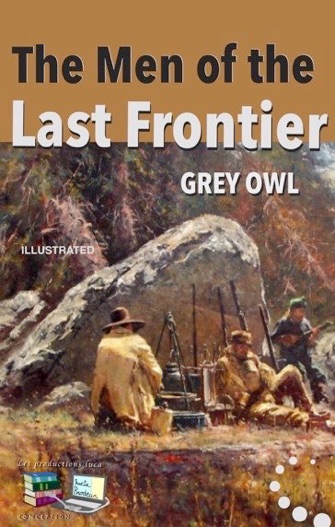The Vanguard
...
This whiskey-jack is a small bird, about the size of a blackbird, but he has more mischief in his small body than there is in a whole bag of cats. He is a scamp, but a likeable rascal, at that. He mocks the calls of other birds and steals bait, or any small articles left around the camp.
He loves human company, and, at the first smoke of a camp-fire, he appears mysteriously from nowhere, like a small grey shadow, and perches on a limb, generally right over the trapper's lunch place, knocking snow down his neck or into the cooking as he lights.
He has a foolish little song he whistles which is supposed, no doubt, to charm the hunter into giving him a part of his meal. This he generally gets, but does not eat, carrying it away and cacheing it; so he is never full, and stays until the last morsel has disappeared.
A lonely man cannot resist the little bird's begging, and he, as he gets fed, becomes bolder and, should the man move away to fix the fire, will even steal out of the lunch bag. If shoo'ed away, Mr. Whiskey Jack will fly up squawking into a branch and maybe knock some more snow down the trapper's neck, or on to his mitts which he is carefully drying.
A pleasant hour having been spent in this way, the trapper moves on, thinking himself well rid of this impish familiar, and continues baiting his sets. Friend whiskey-jack follows silently and invisibly behind, flying from tree to tree.
When the trapper stops and baits his trap, the nuisance watches until he is gone, and just as carefully unbaits it, removing the meat piece by piece, and cacheing it—and so all along the line for miles. And when the trapper returns to his fire place, there is his chum, sitting innocently up on a limb, singing his crazy song, waiting for some more to eat.
At one camp I had, there were five or six of these birds, and they used to follow me out on the trail in this way; and in selecting their portion from any moose-meat there was, believe me, they knew the steak from the neck.
A man alone for months is glad of their company, in spite of the trouble they make; and for me their friendliness and cheerful whistling have brightened many a lonesome camp fire.
By some dispensation of Providence the unpleasant happenings, the freezings, the burnings, the starvation trips, and the terrific labour are soon forgotten, only the successes and triumphs are remembered. Were it otherwise, not one man in ten would return to the bush after the first trip.
A man may be soaking wet, half-frozen, hungry and tired, landed on some inhospitable neck of the woods, vowing that a man is a fool to so abuse himself. Yet, let him but make a fire, get a sheet of canvas between himself and the elements, and a dish of hot tea under his belt, and his previous state of misery will fade from his mind; and he will remark to his partner, his dogs, or his tea-pail, that "Home was never like this," or that "This is the life."
He overcomes his difficulties by skill and cunning, rather than by force, taking a leaf from the Indian's book, thus husbanding his energies against the time when he is tried by the supreme tests of endurance, which occur frequently enough.
A saving sense of humour eradicates all feeling of self-pity in times of stress, the only feeling being that elation which one lone man may experience at prevailing against overwhelming odds, and the only comments passed are a few quaint remarks on the queer tricks of Fate. The more lurid flows of profanity are reserved for trivial occurrences, where the energy thus expended will not be missed.
This optimistic state of mind must be carried to the point where—if he lose a canoe-load of goods through miscalculation, or incorrect handling in a rapids, or should a toboggan piled with necessaries, and what few luxuries he permits himself, go through the ice after being hauled eighty miles or so—he must be glad it was not worse, see only the silver lining, and remember he did not drown. Also that he is lucky to, perhaps, have saved a few matches in a waterproof case, or that he kept his hat dry maybe.
He who lives by the hunt must be patient, and of a monumental calm. The constant petty annoyances incident to everyday travel, trivial in themselves, become by constant repetition exasperating to a degree, and would soon drive an irritable man to the verge of insanity.
Being much alone, this modern Spartan subjects himself to a discipline as severe as that demanded of any soldier, for he cannot allow his emotions ever to gain the upper hand, lest they get complete control, and that way madness lies.
...


